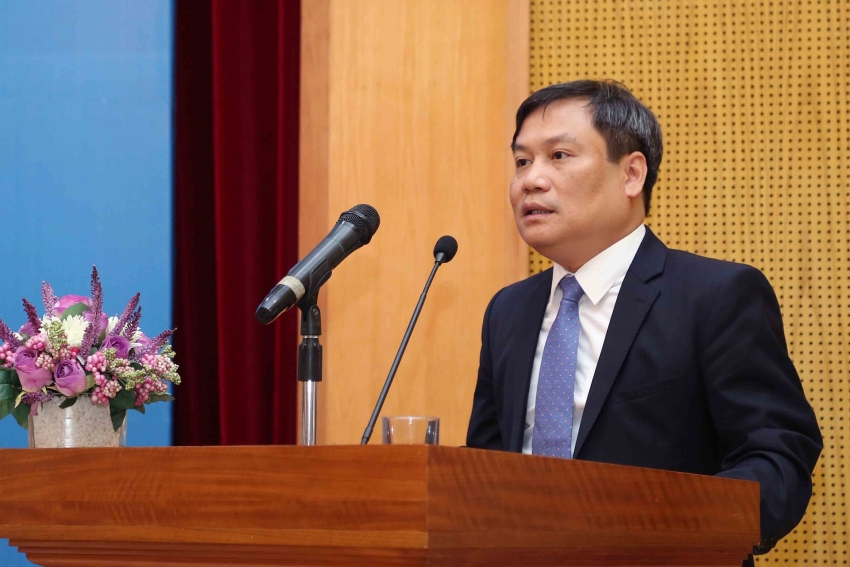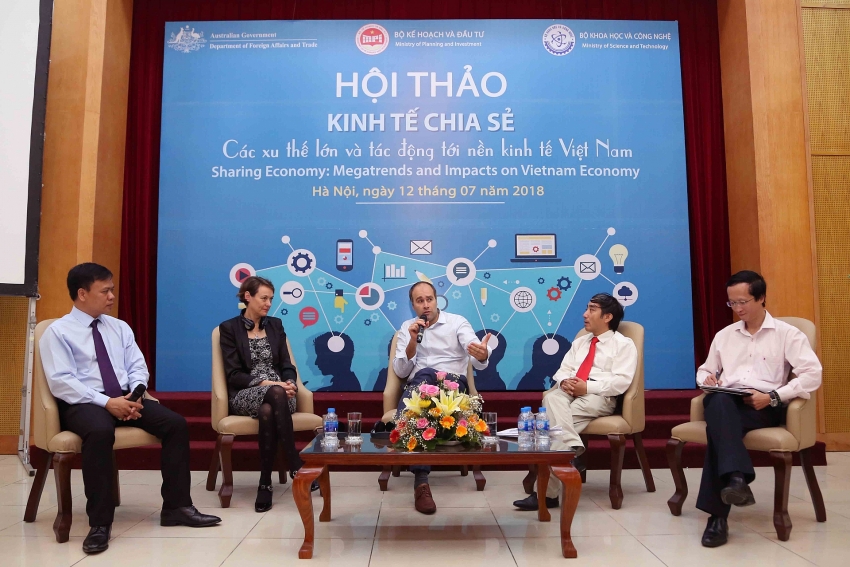Proactively taking advantages of sharing economy
 |
| Vu Dai Thang, Deputy Minister of Planning and Investment |
Market value reaching $335 billion by 2025
The sharing economy is part of the digital economy, a result of applying creativity and innovation to improve productivity. Representatives of the workshop on “Sharing economy: Megatrends and Impacts on the Vietnamese Economy” took place on July 12 stated that the sharing economy is a new business form restructuring numerous economic sectors, especially the services sector towards improving performance and creating more opportunities for customers, increasing transparency and competitiveness.
In Vietnam, the concept of the “sharing economy” has only emerged but carries great potential for development.
Deputy Minister of Planning and Investment Vu Dai Thang said that the sharing economy started in Vietnam later than in the world, but it has been developing at an astounding pace with the appearance of Uber, Grab, and Airbnb, becoming popular among users.
Instead of importing these apps, Vietnam is trying to develop its own sharing economy products to book for travel, hotels, and vehicles.
Deputy Minister of Science and Technology Pham Dai Duong agreed with Thang and assessed that the sharing economy makes up for a large proportion in other economies. It has been developing and impacting the economic development of Vietnam.
According to research by PwC, global sales of all companies developing sharing economy application platforms was $15 billion in 2014, and is expected to hit $335 billion by 2025. This means it will increase by 22 times in ten years.
Opportunities and challenges of Vietnam
Talking about Vietnam’s opportunities, Chargé d’Affaires of the Autralian Embassy in Vietnam Rebecca Bryant said that with a well-educated and young population and almost 70 per cent of the people owning a smart phone, the Vietnamese economy stands to benefit significantly from these developing technologies.
She said that one of the greatest changes in recent years has been the development of the sharing economy. “While the sharing economy is still in its infancy at the moment, it will inevitably become a major part of the economy—both at a national and global level,” she noted.
 |
| Representatives discussing on sharing economy |
Nguyen Thi Tue Anh, vice president of the Central Institute for Economic Management (CIEM), assessed that the nature of the sharing economy is a new business model which takes advantage of digital technologies, thus reducing transaction costs and accessing a big number of customers through digital foundation.
The sharing economy is different from the traditional model as all transactions are implemented online by a third party. It provides more choices to customers with cheaper prices. Individuals joining in the sharing economy could be working part-time as a side job to increase their income.
The sharing economy has developed in the sectors of transport services (Uber, Grab, Lyft, and Zipcar), tourism and hotel services (Airbnb, VRBO), labour (Homejoy and Handy, TaskRabbit, Upwork), and financial services (Kickstarter, Indiegogo, Lending Club).
“The sharing economy will become a consumption trend in the future. It is forecast to expand to different sectors in the upcoming time,” Tue Anh said, adding that people in developing countries were expected to join in resource sharing with others more than in developed ones.
She said the sharing economy could create new business methods, opening new business opportunities based on digital foundations and the Fourth Industrial Revolution.
“With the sharing economy, the market would become more competitive with diversified services, thus bringing benefits to consumers. In addition, it would also bring more investment opportunities, creating jobs and increasing incomes,” she added.
The sharing economy could also help save natural resources, make use of abundant assets, and protect the environment. It could also foster the development of a renovation and startup ecosystem.
“The sharing economy could be an opportunity for Vietnam’s administrative reform toward e-government to effectively participate in the digital economy and Industry 4.0,” she noted.
However, the sharing economy could also have potential challenges, mainly due to the threat of conflicting with traditional business models.
“These challenges could be named as unequal competition, economic concentration, and lack of tools to protect consumers online. State management agencies could struggle to control the new models, especially financial duties,” she said.
Thus, Tue Anh suggested the government to continue to improve the business environment to adapt with the rapid development of the digital economy while ensuring equality between the new model and the traditional one. Suitable policies should be studied to encourage the model’s development.
“The building of an e-government and information and technology foundation should be accelerated, especially building an open data system to serve for state management on the sharing economy model,” she said.
Thang said Vietnam has not been an exception in the development of this business model.
“Both benefits and risks for the economy and consumers have been seen. It was the reason for the building of new policies and amending the current regulations to fully tap into opportunities brought by the sharing economy while minimising positive impacts,” he said.
Thang added that Vietnam has been studying international experiences on the impacts of big trends of digital technologies to the economy. This could help the government have the necessary information to provide a suitable strategy in the wave of Industry 4.0.
What the stars mean:
★ Poor ★ ★ Promising ★★★ Good ★★★★ Very good ★★★★★ Exceptional
Related Contents
Latest News
More News
- VNPAY and NAPAS deepen cooperation on digital payments (February 11, 2026 | 18:21)
- Vietnam financial markets on the rise amid tailwinds (February 11, 2026 | 11:41)
- New tax incentives to benefit startups and SMEs (February 09, 2026 | 17:27)
- VIFC launches aviation finance hub to tap regional market growth (February 06, 2026 | 13:27)
- Vietnam records solid FDI performance in January (February 05, 2026 | 17:11)
- Manufacturing growth remains solid in early 2026 (February 02, 2026 | 15:28)
- EU and Vietnam elevate relations to a comprehensive strategic partnership (January 29, 2026 | 15:22)
- Vietnam to lead trade growth in ASEAN (January 29, 2026 | 15:08)
- Japanese business outlook in Vietnam turns more optimistic (January 28, 2026 | 09:54)
- Foreign leaders extend congratulations to Party General Secretary To Lam (January 25, 2026 | 10:01)

 Tag:
Tag:


























 Mobile Version
Mobile Version